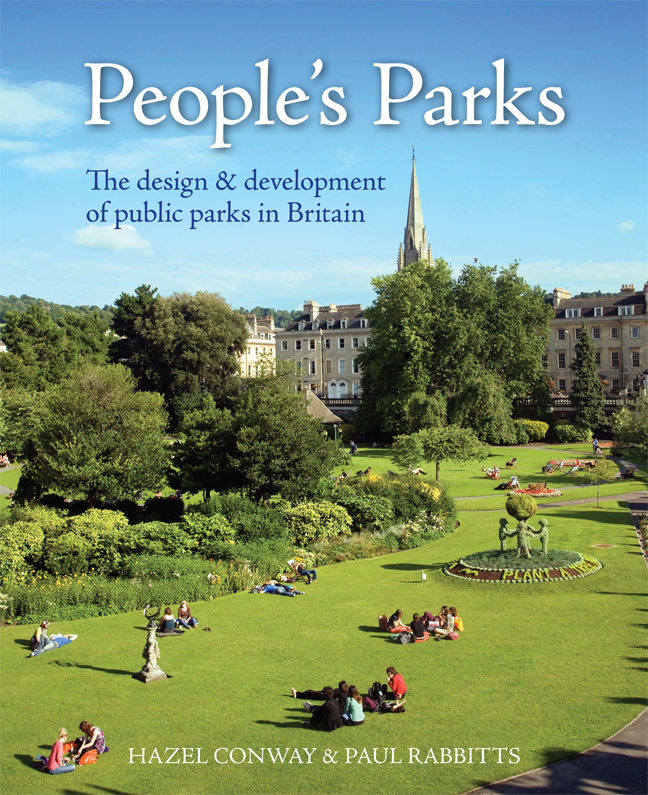Book contents
- Frontmatter
- Dedication
- Contents
- Miscellaneous Frontmatter
- Preface
- Acknowledgements
- Foreword
- A Word from Parks Professionals, Politicians and Parks Organisations
- Introduction: Dr Hazel Conway (1991)
- 1 Public Parks and Municipal Parks
- 2 The Need for Parks
- 3 Pioneering Parks Development
- 4 The Park Movement
- 5 Design and Designers
- 6 Lodges, Bandstands and the Cultivation of Virtue
- 7 Local Pride and Patriotism
- 8 Planting and Park Maintenance
- 9 Permitted Pastimes
- 10 Recreation Grounds, Parks and the Urban Environment
- 11 Public Parks, 1885–1914
- 12 Later Municipal Park Designers
- 13 Garden Cities and the New Towns Movement
- 14 Sport, Physical Activity and Recreation in Public Parks in the Inter-war Years
- 15 Parks Management – a Changing Perspective
- 16 Decline, Revival and Renewal – the Role of Parks into 21st-century Britain
- Appendix 1 Summary of main legislation promoting early park development
- Appendix 2 Chronology of main municipal and public park developments between 1800 and 1885
- Notes
- Bibliography
- Subscription List
- Index
3 - Pioneering Parks Development
Published online by Cambridge University Press: 22 February 2024
- Frontmatter
- Dedication
- Contents
- Miscellaneous Frontmatter
- Preface
- Acknowledgements
- Foreword
- A Word from Parks Professionals, Politicians and Parks Organisations
- Introduction: Dr Hazel Conway (1991)
- 1 Public Parks and Municipal Parks
- 2 The Need for Parks
- 3 Pioneering Parks Development
- 4 The Park Movement
- 5 Design and Designers
- 6 Lodges, Bandstands and the Cultivation of Virtue
- 7 Local Pride and Patriotism
- 8 Planting and Park Maintenance
- 9 Permitted Pastimes
- 10 Recreation Grounds, Parks and the Urban Environment
- 11 Public Parks, 1885–1914
- 12 Later Municipal Park Designers
- 13 Garden Cities and the New Towns Movement
- 14 Sport, Physical Activity and Recreation in Public Parks in the Inter-war Years
- 15 Parks Management – a Changing Perspective
- 16 Decline, Revival and Renewal – the Role of Parks into 21st-century Britain
- Appendix 1 Summary of main legislation promoting early park development
- Appendix 2 Chronology of main municipal and public park developments between 1800 and 1885
- Notes
- Bibliography
- Subscription List
- Index
Summary
In the decade following the SCPW Report a number of parks were created but few of them owed a specific debt to the SCPW, and it was not until c 1845 that the park movement became recognisable as such (Appendix 2). In this pioneering period of 1833–45, initiatives important to the developing park movement came from central and local government, from benefactors and from the community. Parliament took certain rather minimal steps to promote parks generally and it also took action to create parks in London. To promote park development, the SCPW had recommended stimulating ‘the liberality of individuals’, but before legislation could be introduced to do so, the first benefactors came forward to donate parks in Derby and Sheffield. Norfolk Park, Sheffield (1841), donated by the Duke of Norfolk, was laid out very simply with open spaces for cricket and football and a shady peripheral walk with regularly placed seats and avenues of lime trees and turkey oaks, but Derby's design and designer proved more influential. This period saw the successful financial lessons of park development, illustrated at Regent's Park, applied by the speculative developer in Liverpool and by the local authority at Birkenhead. These ventures gave Joseph Paxton his first opportunities for public park design. This period also saw the involvement of the community in park development, and Manchester became the first of the major industrial centres to acquire parks, through the ‘local exertion and munificence’ of its citizens, while the Amicable Society of Woolsorters of Bradford began developing their pleasure gardens and baths.
Parliamentary action
The reaction of Parliament to the SCPW Report was influenced by both individuals and groups. James Silk Buckingham, elected MP for Sheffield in 1832, was among those actively concerned with open space for recreation, and for three years in succession he introduced bills to establish walks, playgrounds and public baths. Although none was passed, his continued pressure was important. In 1833 the influence of the utilitarians and J A Roebuck was much greater than their actual numbers, and Roebuck grasped the opportunity presented by the SCPW Report. ‘At last, we are getting support for our open spaces and trees. I have promises from more than 20 today … soon our towns will blossom and the air will be pure.’
- Type
- Chapter
- Information
- People's ParksThe design & development of public parks in Britain, pp. 19 - 30Publisher: Boydell & BrewerPrint publication year: 2023



